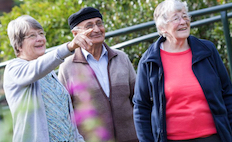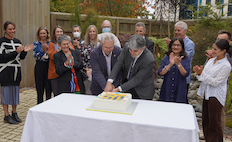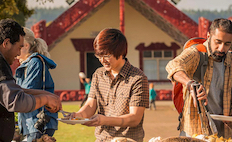Our lifespan research cluster brings together research groups with a full lifecourse perspective and those focusing on particular stages, and places in time.
Visit the listings of our research groups or our featured projects:
Ageing Well | Kia eke kairangi ki te taikaumātuatanga
A National Science Challenge
Adding life to years
 The Challenge is a collaboration between the Universities of Otago, Auckland, Canterbury, Massey, Waikato, Victoria and Auckland University of Technology together with the Centre for Research Evaluation and Social Assessment, and AgResearch.
The Challenge is a collaboration between the Universities of Otago, Auckland, Canterbury, Massey, Waikato, Victoria and Auckland University of Technology together with the Centre for Research Evaluation and Social Assessment, and AgResearch.
Ageing Well's vision is to add life to years for all older New Zealanders. This will be achieved by harnessing science to sustain health and wellbeing into the later years of life.
Email: administrator.ageingwell@otago.ac.nz
Website: ageingwellchallenge.co.nz
Centre for Neuroendocrinology | Te Pokapū Mātai Taiāki Iaia
A University of Otago Research Centre
Understanding the regulation of fertility, reproduction, and body weight
We study how the brain controls hormones in the blood, and how these hormones can regulate the brain's activity. Our specialist expertise is at the forefront of global neuroendocrinology research.
We have three themes of research that focus upon understanding the neural regulation of:
- Reproduction
- Body weight and metabolism
- Stress
Email: dave.grattan@otago.ac.nz
Website: otago.ac.nz/neuroendocrinology
Child Health Research at Otago | Rangahau Oranga Tamariki ki Ōtākau
A University of Otago Research Strength
Investigating health issues affecting our youngest New Zealanders
 Child Health Research at Otago gathers together the research expertise and activities of scientists investigating health issues primarily affecting our youngest New Zealanders.
Child Health Research at Otago gathers together the research expertise and activities of scientists investigating health issues primarily affecting our youngest New Zealanders.
We also partner with a wide range of stakeholders, communities, institutions, and nations beyond New Zealand to collaborate on health issues of global significance.
Explore our child health research:
- Alphabetical listing of our child health research groups
- Genetics and health
- Healthy pregnancies
- Healthy childhoods
- Childhood conditions and treatments
- Inequalities in child health
Email: healthsciences.research@otago.ac.nz
Website: otago.ac.nz/child-health-research
Christchurch Health and Development Study
University of Otago, Christchurch
Health, education and life progress over four decades
The Christchurch Health and Development Study (CHDS) has been in existence for over 40 years. During this time we have followed the health, education, and life progress of a group of 1,265 children born in the Christchurch (New Zealand) urban region in mid-1977.
The cohort has been studied from infancy into childhood, adolescence and adulthood. Data gathered over the course of the study now comprises some 50 million characters of information, with which the study has published over 500 scientific papers, reports, books and book chapters describing the life history of the CHDS cohort.
Email: chds.uoc@otago.ac.nz
Website: otago.ac.nz/christchurch/research/healthdevelopment/
Collaboration of Ageing Research Excellence (CARE) | Te Taki Rangahau Pēperekou
A University of Otago Research Theme
Studying ageing in all its aspects
 CARE conducts research in gerontology—the study of ageing in all its aspects. Gerontology is becoming increasingly important in developed countries, including New Zealand, because of our ageing populations.
CARE conducts research in gerontology—the study of ageing in all its aspects. Gerontology is becoming increasingly important in developed countries, including New Zealand, because of our ageing populations.
Our network's areas of research strength include:
- Physical health
- Brain health
- Social and policy development
Email: care@otago.ac.nz
Website: otago.ac.nz/care
Dunedin Study
Following a generation of New Zealanders
 The Dunedin Multidisciplinary Health and Development Study (Dunedin Study) is an ongoing, longitudinal study of the health, development and well-being of a general sample of New Zealanders.
The Dunedin Multidisciplinary Health and Development Study (Dunedin Study) is an ongoing, longitudinal study of the health, development and well-being of a general sample of New Zealanders.
Participants were studied at birth (1972-73), followed up and assessed at the age of three when the longitudinal study was established. Since then they have been assessed every two years until the age of 15, then at ages 18, 21, 26, 32, 38 and 45. Further assessments hope to continue.
Email: dmhdru@otago.ac.nz
Website: dunedinstudy.otago.ac.nz
Healthier Lives | He Oranga Hauora 2015–2024
A National Science Challenge
Achieving healthier lives for all New Zealanders
 The Healthier Lives National Science Challenge was a national research collaboration dedicated to achieving healthier lives for all New Zealanders.
The Healthier Lives National Science Challenge was a national research collaboration dedicated to achieving healthier lives for all New Zealanders.
It has contributed evidence, technology and tools that can help to achieve more equitable health outcomes in Aotearoa New Zealand.
The website remains available as a resource and for archived materials.
Website healthierlives.co.nz
Tū Ora – Otago Falls Network
A University of Otago Research Network
Positive approaches to falls prevention tailored to communities
Our Otago Falls Network researchers are applying positive approaches to falls prevention research, attempting to avoid deficit approaches. Hence our name, Tū Ora (Standing Well).
A strength of our network of researchers is to support research that embraces indigenous and underserved communities. We also consider falls prevention from a lifecourse approach with a focus on increasing quality of life throughout the lifespan.
Website: otago.ac.nz/research/centres/otago0244591.html
Lifespan research featured projects | Rangahau mō te roanga o te oranga tangata
Children's insights
 New research that empowers the voices of three- and four-year-olds as urban planners has opened a conversation around how children view the communities they live in. It has revealed a new generation of considerate and future-oriented planners.
New research that empowers the voices of three- and four-year-olds as urban planners has opened a conversation around how children view the communities they live in. It has revealed a new generation of considerate and future-oriented planners.
The enduring legacy of whakapapa
 You would be hard pressed to find an academic career more life-imprinted than that of Associate Professor Karyn Paringatai at Te Tumu – School of Māori, Pacific and Indigenous Studies.
You would be hard pressed to find an academic career more life-imprinted than that of Associate Professor Karyn Paringatai at Te Tumu – School of Māori, Pacific and Indigenous Studies.
Research in our four academic divisions | Te rangahau ki ō mātou whare mātauranga e whā
View more research activity in our academic divisions: